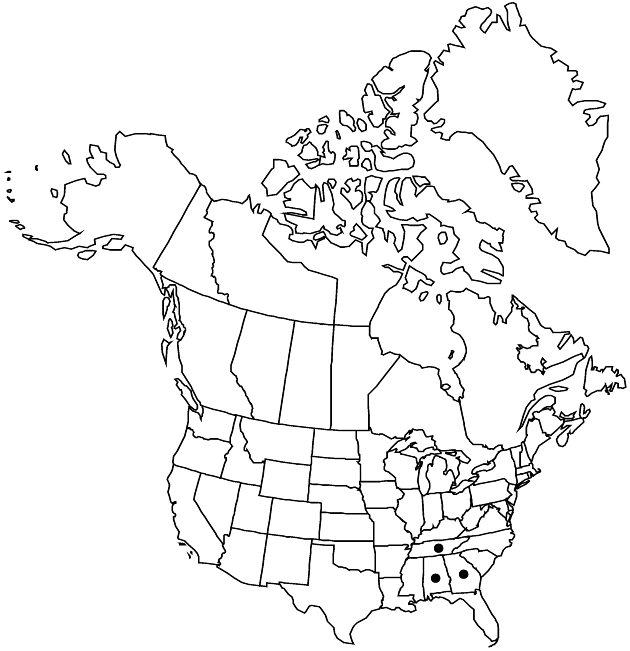Difference between revisions of "Helianthus smithii"
Rhodora 66: 346. 1964.
FNA>Volume Importer |
imported>Volume Importer |
||
| (5 intermediate revisions by 2 users not shown) | |||
| Line 8: | Line 8: | ||
}} | }} | ||
|common_names=Smith’s sunflower | |common_names=Smith’s sunflower | ||
| − | |basionyms={{Treatment/ID/ | + | |special_status={{Treatment/ID/Special_status |
| + | |code=E | ||
| + | |label=Endemic | ||
| + | }}{{Treatment/ID/Special_status | ||
| + | |code=C | ||
| + | |label=Conservation concern | ||
| + | }} | ||
| + | |basionyms={{Treatment/ID/Basionym | ||
|name=Helianthus parviflorus var. attenuatus | |name=Helianthus parviflorus var. attenuatus | ||
|authority=A. Gray | |authority=A. Gray | ||
| + | |rank=variety | ||
| + | |publication_title=in A. Gray et al., Syn. Fl. N. Amer. | ||
| + | |publication_place=1(2): 278. 1884, | ||
}} | }} | ||
|synonyms= | |synonyms= | ||
| Line 37: | Line 47: | ||
-->{{#Taxon: | -->{{#Taxon: | ||
name=Helianthus smithii | name=Helianthus smithii | ||
| − | |||
|authority=Heiser | |authority=Heiser | ||
|rank=species | |rank=species | ||
| Line 51: | Line 60: | ||
|publication title=Rhodora | |publication title=Rhodora | ||
|publication year=1964 | |publication year=1964 | ||
| − | |special status= | + | |special status=Endemic;Conservation concern |
| − | |source xml=https:// | + | |source xml=https://bitbucket.org/aafc-mbb/fna-data-curation/src/2e0870ddd59836b60bcf96646a41e87ea5a5943a/coarse_grained_fna_xml/V19-20-21/V21_381.xml |
|tribe=Asteraceae tribe Heliantheae | |tribe=Asteraceae tribe Heliantheae | ||
|subtribe=Asteraceae (tribe Heliantheae) subtribe Helianthinae | |subtribe=Asteraceae (tribe Heliantheae) subtribe Helianthinae | ||
Latest revision as of 20:11, 5 November 2020
Perennials, 70–150 cm (rhizomatous). Stems (usually purplish) erect, glabrous (glaucous). Leaves cauline; opposite (proximal) or alternate; petioles to 1.3 cm; blades (light to dark green, 1-nerved) lance-linear to lanceolate, 7–18 × 1–1.8 cm, bases ± cuneate, margins serrulate, abaxial faces ± hispid, gland-dotted. Heads 1–5. Peduncles 3–6 cm. Involucres hemispheric, 5–15 mm diam. Phyllaries 15–20, lanceolate, 6–9 × 2–2.7 mm, (margins ciliate) apices short-acuminate, abaxial faces glabrous or glabrate, not gland-dotted. Paleae 5.5–6.5 mm, 3-toothed (gland-dotted). Ray florets 6–9; laminae 10–15 mm. Disc florets 25+; corollas 5.5–6 mm, lobes yellow; anthers dark, appendages dark. Cypselae 2.8–3 mm, glabrate; pappi of 2 aristate scales 1.5–2 mm. 2n = 68.
Phenology: Flowering late summer–fall.
Habitat: Dry, open woods
Elevation: 100–300+ m
Distribution

Ala., Ga., Tenn.
Discussion
Of conservation concern.
Helianthus smithii is known from relatively few sites. T. A. Storbeck (1984) concluded that it is a distinct species; he could not rule out the possibility that it might be a hybrid of H. microcephalus and H. strumosus. It may also be an extreme variant of H. strumosus that has relatively narrow leaves and small heads.
Selected References
None.